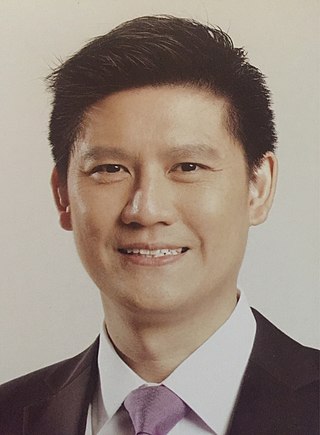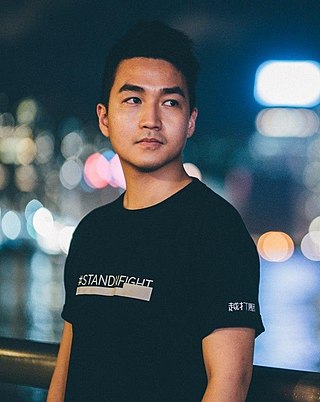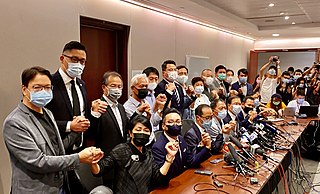
The Hong Kong Association for Democracy and People's Livelihood (ADPL) is a Hong Kong pro-democracy social-liberal political party catering to grassroots interest with a strong basis in Sham Shui Po. Established on 26 October 1986,it was one of the three major pro-democracy groups along with the Meeting Point and the Hong Kong Affairs Society in the 1980s.

Basic Law Article 45 Concern Group was a pro-democracy political group in the Hong Kong Special Administrative Region of the People's Republic of China (HKSAR). It was established on 14 November 2003 by legal practitioners and academics. It had four seats in the Legislative Council of Hong Kong before it transformed into the Civic Party in 2006.

Ronny Tong Ka-wah is a senior counsel and politician in Hong Kong. He is a current non-official member of the Executive Council of Hong Kong. He co-founded the Civic Party and was a member of the Legislative Council of Hong Kong,representing the New Territories East constituency from 2004 until he quit the party and resigned from the legislature on 22 June 2015,following the historic vote on Hong Kong electoral reform a few days earlier,having switched his political alignment from pro-democracy to pro-Beijing Hong Kong political group Path of Democracy,of which he is currently the convener.

The New Territories East geographical constituency was one of the five geographical constituencies in the Legislative Council of Hong Kong. It was established in 1998 for the first SAR Legislative Council election and was abolished under the 2021 overhaul of the Hong Kong electoral system. It encompassed Sha Tin District,Tai Po District,North District and Sai Kung District. In the 2016 Legislative Council election,nine members of the Legislative Council using the Hare quota of party-list proportional representation with 1,139,616 electorates in 2020.

The pro-democracy camp,also known as the pan-democracy camp,is a political alignment in Hong Kong that supports increased democracy,namely the universal suffrage of the Chief Executive and the Legislative Council as given by the Basic Law under the "One Country,Two Systems" framework.

Kwok Ka-ki is a democratic Hong Kong former politician. He is a private urology doctor,having graduated from the Faculty of Medicine at the University of Hong Kong. Kwok is a member of the Civic Party,having joined on 19 July 2010. On 11 November 2020,he was disqualified from the Legislative Council,along with three other lawmakers of the pan-democratic camp,by the central government in Beijing on request of the Hong Kong government. A mass resignation of pan-democrats the same day left the Legislative Council without a substantial opposition.

The Civic Party (CP) was a pro-democracy liberal political party from March 2006 to May 2023 in Hong Kong.

Wu Chi-wai,MH is a Hong Kong politician. He is the former chairman of the Democratic Party from 2016 to 2020 and a former member of the Legislative Council of Hong Kong for Kowloon East constituency from 2012 to 2020. He was also a member of Wong Tai Sin District Council from 1999 to 2019 and member of the Urban Council from 1995 to 1999.

The 2016 Hong Kong Legislative Council election was held on 4 September 2016 for the 6th Legislative Council of Hong Kong (LegCo). A total of 70 members,35 from geographical constituencies (GCs) and 35 from functional constituencies (FCs),were returned. The election came after the rejection of the 2016/2017 constitutional reform proposals which suggested the electoral method for the 2016 Legislative Council remains unchanged.

The 2016 New Territories East by-election was held on 28 February 2016 after the incumbent Legislative Councillor Ronny Tong Ka-wah of New Territories East quit the Civic Party and resigned from the Legislative Council of Hong Kong (LegCo),effective on 1 October 2015.

Path of Democracy is a political group and think tank established in 2015 in Hong Kong. It is led by former Civic Party legislator Ronny Tong,who joined the Executive Council on 1 July 2017. Although officially unaligned with either the pro-Beijing camp or the pro-democracy camp,the group has been supportive of the policies and legislation put forward by the former,and was considered by the media to be pro-Beijing by 2021.

Au Nok-hin is a pro-democracy politician in Hong Kong. He is the former member of the Legislative Council for Hong Kong Island from 2018 to 2019 and member of the Southern District Council for Lei Tung I from 2012 to 2019.

Roy Kwong Chun-yu is a Hong Kong politician and novelist. He is a member of the Democratic Party and former member of the Yuen Long District Council for Pek Long. He became a member of the Legislative Council of Hong Kong in 2016 through the District Council (Second) "super seat". Kwong resigned along with 14 other remaining pro-democracy legislators from the Legislative Council on 11 November 2020,after the central government had unseated four of pro-democracy legislators the same day.

Jeremy Jansen Tam Man-ho is a Hong Kong politician,airline pilot,and former Vice-Chairman of the Hong Kong Civic Party's Kowloon East Branch. He was a former member of the Legislative Council representing Kowloon East,having been elected in the 2016 Hong Kong Legislative Council election. Tam resigned along with 14 other remaining pro-democracy legislators from the Legislative Council on 11 November 2020,after the central government had unseated four of pro-democracy legislators the same day.

Ricky Or Yiu-lam is a Hong Kong politician and a former member of the Sai Kung District Council for Kwong Ming. He is the former chairman of the Concern Group for Tseung Kwan O People's Livelihood and a former member of the Democratic Party.

Cheng Tat-hung,also known as Tat Cheng,is a Hong Kong politician,formerly affiliated with the Civic Party. He was a member of Eastern District Council for Tanner from 2016 to 2021.
In the subsequently postponed 2020 Hong Kong Legislative Council election,12 opposition candidates were disqualified by the returning officers from running in the election,including four incumbent legislators,Alvin Yeung,Kwok Ka-ki,Dennis Kwok and Kenneth Leung,as well as activists Joshua Wong,Ventus Lau,Gwyneth Ho and Cheng Kam-mun and incumbent District Councillors Lester Shum,Tiffany Yuen,Fergus Leung and Cheng Tat-hung.

The 2020 Hong Kong Legislative Council election was originally scheduled on 6 September 2020 until it was postponed by the government. On 31 July 2020,Chief Executive Carrie Lam announced that she was invoking the Emergency Regulations Ordinance to postpone the election under the emergency powers granted to her by it,citing the recent resurgence of the COVID-19 cases,adding that the move was supported by Beijing.

On 11 November 2020,15 Hong Kong pro-democracy members of the Legislative Council announced their resignations in protest against the decision of the National People's Congress Standing Committee (NPCSC) which bars Legislative Council members from supporting Hong Kong independence,refusing to recognise Beijing's sovereignty over Hong Kong,seeking help from "foreign countries or foreign forces to interfere in the affairs of the region" or committing "other acts that endanger national security" that resulted in the disqualification of pro-democracy legislators Alvin Yeung,Dennis Kwok,Kwok Ka-ki and Kenneth Leung. In July 2020,the four had been barred from running in the subsequently postponed Legislative Council election originally scheduled for September 2020. The resignation en masse left the Legislative Council membership dwindled to 43 out of the total number of 70 seats,with virtually no opposition for the first time since the 1997 handover.
The centrist camp, also known as the moderate camp or moderate groups,is Hong Kong's moderate political alignment.


















